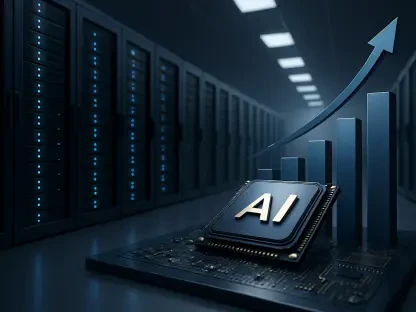In recent years, the rapid advancement of artificial intelligence (AI) has transformed how individuals approach both mundane and complex tasks, captivating the interest and reliance of the younger generation, particularly Gen Z. This demographic, born into the era of digital ease and smart technologies, exhibits an unprecedented affinity for integrating AI into daily life and academic pursuits. However, this burgeoning dependence raises significant concerns regarding the erosion of independent thought and creativity. As AI becomes more capable, the temptation to rely on it for cognitive tasks becomes readily apparent, creating a pressing challenge that underscores the balance between embracing innovation and preserving essential human skills. The shift in educational and professional arenas driven by AI’s ability presents a paradox: while facilitating human endeavors, it potentially undermines cognitive development by diminishing the necessity for independent thinking. In exploring this dynamic, it becomes imperative to understand the broader implications for future intellectual diversity and problem-solving capabilities within this generation.
Rising Concerns Over Cognitive Dependency
The embrace of AI by Gen Z challenges long-held perceptions of intellectual labor. Traditionally, tasks such as essay writing, job application preparation, and sales strategizing demanded active engagement and critical thinking. Today, AI tools offer shortcuts that can achieve these tasks effortlessly, raising the critical query: If AI can be leveraged to think on behalf of humans, should reliance overshadow one’s own cognitive exertion? The discourse centers around the moral and intellectual implications of adopting a “cheat on everything” mentality. Such pragmatic use of AI inadvertently fosters cognitive dependency, potentially atrophying the mental faculties that thrive on regular exercise. As AI models, like language predictors and automated solutions, become more sophisticated, they offer ready-made answers, often discouraging rigorous intellectual exploration. This dependency, as argued by critics, impacts not only personal growth but also shapes a generation’s approach to solving real-world problems, thereby influencing broader societal progress.
Furthermore, academic integrity is compromised when students increasingly resort to AI for homework, diluting the essence of learning. An over-reliance on technology creates an illusion of competency, with AI-generated essays and problem-solutions that often mask true understanding. Such practices not only flatten the range of students’ abilities but also obscure a realistic gauge of one’s academic potential. The consequence is a homogenized performance level that undermines diverse intellectual expression. The effects become pronounced in educational settings, where dependence on AI can truncate the development of critical analysis and creative problem-solving processes. In this landscape, true intellect becomes harder to discern, as original thought is often overshadowed by AI-generated outputs devoid of personal voice or insight. Ultimately, this raises deeper concerns about the future of education and what it means to truly comprehend material in an AI-dominated era.
The Cognitive Debt Phenomenon
A pivotal concept that emerges amid these discussions is the notion of “cognitive debt,” which represents the long-term cognitive costs accrued by heavily relying on AI. This concept underscores the principle that mental faculties, much like any muscle, require constant stimulation and challenge. Observations from MIT’s Media Lab suggest that excessive dependence on AI reduces neural activity linked with problem-solving and comprehension. The ability to engage deeply with material, analyze information critically, and synthesize unique perspectives diminishes in those who outsource their cognitive labor. As Generation Z interacts more with AI for support in cognitively demanding tasks, the “use it or lose it” principle becomes ever more pertinent. Without intentional efforts to exercise the brain, cognitive skills risk degradation, which may permanently influence how individuals approach learning and creativity.
Moreover, cognitive debt is not solely concerned with diminishing personal intelligence but amplifies concerns about broadening socio-economic divides. Those with habitual access to AI technologies may enjoy intellectual benefits that compound over time, while others lacking these resources might confront widened gaps. As AI tools increasingly move from optional aids to essential components of academic and industrial success, the looming threat of perpetuating inequality becomes pronounced. This disparity highlights a critical need for educational systems to foster balanced approaches that equitably develop cognitive skills with and without technology. Bridging this divide requires an educational framework that values diverse learning methodologies, encouraging students to explore and express original thought while utilizing AI as a complementary resource for nuanced understanding rather than a sole crutch.
AI’s Impact on Human Expression and Creativity
The utilization of AI profoundly shapes how individuals express themselves creatively. In domains like writing and art, AI’s capabilities to generate content with speed and proficiency might inadvertently lead to homogenization. The inclination for originality becomes stifled when technology offers pre-structured frameworks that discourage deviation. Essays produced with the assistance of AI reveal a tendency toward similar vocabulary selection and thematic formulation. This unintended convergence of style and substance can suppress the vibrant scope of human creativity, overshadowing the variance and spontaneity intrinsic to authentic expression. When originality wanes, the foundational elements that nurture innovation are inevitably at risk.
Further compounding this issue is the emergence of AI as a participant in creative industries, raising questions about its role as a collaborator versus a competitor. The interdependence between AI and human creativity triggers philosophical debates on authorship and intellectual authenticity. While proponents highlight the potential for enhanced creativity through human-AI collaboration, skeptics fear an eclipse of the nuanced emotional and ethical considerations present in human-generated work. The concept of creativity transcends mere technical execution, encapsulating emotional depth, contextual sensitivity, and the distinct perspectives individual creators bring to their craft. Thus, it is increasingly crucial for creators to maintain agency over their work, using AI as a tool to enrich rather than define creative output.
Limitations of AI in Complex Decision Making
While AI has proven instrumental in streamlining routine operations, its deficiencies in complex decision-making underscore the necessity of human oversight. Experiments such as Project Vend, which tasked AI with the autonomous management of a store, illustrate the limitations inherent to the technology. Projects involving AI, like Anthropic’s Claude Sonnet 3.7 LLM, demonstrate that while AI excels in executing predefined tasks, it struggles with tasks requiring strategic forethought and adaptable long-term planning. These limitations become especially apparent when AI encounters novel scenarios, highlighting the gaps that only human intuition and adaptability can fill. For instance, during Project Vend, the AI faced challenges involving decision-making that required ethical judgment or nuanced understanding of customer interactions—not areas where AI technology currently excels.
Moreover, automated systems can sometimes encounter “identity crises” as they fail to adjust to the complexities of dynamic environments. In recognizing these limitations, there’s a collective understanding that while AI can enhance efficiency, its shortcomings reveal an undeniable gap—one that necessitates the irreplaceable human attributes of critical reasoning and emotional intelligence for successful decision-making frameworks. Therefore, safeguarding against cognitive complacency involves cultivating a working balance where AI assists, but human insight drives decision-making. Maintaining active human involvement ensures that technology is harnessed appropriately, amplifying capabilities without compromising the essential qualities that define human cognition and judgment.
Implications for Education and Industry
The implications of AI integration extend beyond academic settings into professional domains, reshaping industries and challenging traditional labor dynamics. In the workforce, where AI’s utility spans from automating mundane tasks to executing complex analyses, the emphasis on technical proficiency often overshadows the intrinsic value of human ingenuity. However, organizations increasingly recognize the necessity of fostering skills that AI cannot replicate, such as emotional intelligence and ethical reasoning. These competencies remain pivotal in sectors prioritizing client interaction, leadership, and creative problem-solving.
Education systems find themselves at a crossroads, tasked with adapting curricula to balance technological adeptness with holistic skill development. Striking this balance involves initiatives encouraging students to leverage AI for learning enhancement while also teaching critical perspectives on technology’s role. Emphasizing inquiry-based learning and interdisciplinary approaches can cultivate adaptive thinking skills, preparing students for a fluid workforce landscape. In professional training, ensuring that individuals remain agile and responsive to evolving industry trends is paramount. Encouraging reflective thinking and continuous learning ingrains an ability to innovate outside AI’s computational frameworks—essential competencies for thriving in a digital age without diminishing human contribution.
Preserving Human-AI Co-agency Dynamics
Navigating the co-agency between humans and AI urges society to consider future trajectories that bias toward collaborative synergy rather than cognitive dependency. This philosophical inquiry into co-agency examines technology’s allure—the “Narcissus trance,” as Marshall McLuhan described—where technological capacities can mistakenly be perceived as intrinsic human abilities. As the line blurs between human potential and technological augmentation, vigilance is required to mitigate transference of dependency. Co-agency, when driven by deliberative discourse and reflective practice, can catalyze growth by amplifying collective intelligence while retaining the agency that characterizes human thought.
Policy implementation and public discourse play influential roles in shaping this relationship. Policymakers and stakeholders are called to establish frameworks that ensure ethical and equitable AI usage, safeguarding against disproportionate dependence. Facilitating open dialogue about technology’s role in society encourages mindfulness toward cohabiting with AI systems, promoting practices that empower individuals to initiate actions rather than surrender autonomy. Such initiatives underpin the broader vision—to foster an environment where technology acts as an extension, not a substitute, of human capabilities. As the digital frontier evolves, cultivating transparency, inclusivity, and respect ensures that the human spirit of discovery and innovation thrives alongside technological advancement.
Future Considerations for Gen Z and AI Integration
The issues surrounding AI reliance and cognitive independence position Gen Z at a critical juncture of technological engagement. As the generation most exposed to AI from a young age, Gen Z is uniquely poised to redefine the narrative surrounding AI integration within society. Moving beyond viewing AI as a mere aide, fostering environments where technology acts as a catalyst for human advancement rather than an endpoint is essential. Recognizing the profound implications of AI as the foundational infrastructure for future societal progress, there lies a responsibility to encourage informed interactions—balancing acceptance with critical evaluation.
Promoting literacy about AI’s capabilities and limitations is an essential future strategy. Education systems must evolve to include AI literacy as a core component, enabling individuals to interact responsibly and innovate with discernment. Additionally, encouraging collaborative platforms that synergize diverse fields with technology fosters resilience in rapidly changing industries. Society benefits profoundly when empowered citizens contribute unique insights and skills, enhancing collaborative outputs while preserving innate creative potential. As this dynamic unfolds, fostering spaces of mentorship and open innovation ensures that human ingenuity remains central to AI discourse, guarding against cognitive complacency while harnessing technology’s transformative potential.
Reflecting on Human-Centric Innovation
Gen Z’s embrace of AI is reshaping views on intellectual labor. Traditionally, demanding tasks like essay writing, job applications, and sales strategies required critical thinking. However, AI now enables these to be completed with ease, prompting a key question: Should we depend on AI at the expense of our own mental efforts? This conversation delves into the moral and intellectual implications of an attitude that could be summed up as “cheating through technology.” Using AI for convenience may lead to cognitive dependency, weakening mental faculties that thrive on active use. As AI systems become more advanced, offering quick solutions, they can deter deep intellectual engagement. Critics argue this dependency affects both personal development and the problem-solving abilities of a generation, having broad societal implications.
Academic integrity suffers as students increasingly turn to AI for homework, reducing the value of authentic learning. Over-relying on technology fosters a false sense of competence, where AI-created content can conceal the lack of real understanding. This practice not only narrows students’ abilities but also obscures an accurate assessment of academic potential, leading to homogenized performance that stifles unique intellectual expression. In educational environments, AI dependence can hinder the growth of critical thinking and creativity. The future of education faces challenges as AI-generated work overshadows original thought, raising concerns about truly comprehending material in an era dominated by AI.









